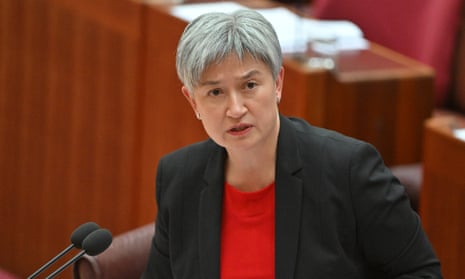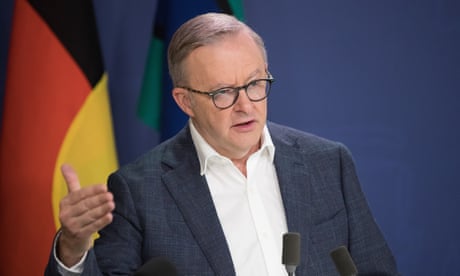
When Hamas militants stormed the border early in October, unleashing the living hell that has followed, Wong condemned the attack and said Israel had a right to defend itself. She counselled against escalation and noted Australia urged “the exercise of restraint and protection of civilian lives”.
Peter Dutton promptly characterised Wong’s restraint cue as an unwelcome curio – a relic of another age – and a pile-on ensued. As I wrote at the time, it seemed simultaneously nuts and yet entirely predictable that championing the quality of restraint in a region with a long history of bloodshed would trigger an unhinging in the echo chamber of Australian politics.
Another round of unhinged behaviour ensued this week after Australia joined 152 countries at the UN general assembly calling for an immediate humanitarian ceasefire along with the immediate and unconditional release of all hostages. Now don’t get me wrong. This was an interesting and significant shift in position given Australia had been hovering, unsteadily, on the ceasefire threshold for weeks, and had abstained during a vote on a similar motion six weeks earlier.
The policy shift was presaged just hours before Wednesday’s UN vote with a joint statement from the Australian, New Zealand and Canadian governments calling for a sustainable ceasefire in the Gaza Strip and an end to the “continuous suffering” of its citizens, while maintaining “there is no role for Hamas in the future governance of Gaza”. This statement, initiated by Australia, had been kicking around in development for weeks, but broke cover just before the UN vote.
This week’s shift in position at the UN had Greg Sheridan, the Australian’s veteran foreign editor, declaring the government had “abandoned its support of Israel”. The UN vote put Australia “in conflict on a fundamental matter” with the US and the UK. Sheridan also felt Anthony Albanese and Wong were presiding over an “incoherent” policy position.
Readers watching the debate tracking alongside the war will have picked up by now that public conversation about the Middle East is no country for nuance. Positions tend to be dug in. But there are a few obvious counter arguments to Sheridan’s critique.
Australia is a friend of Israel, and will go on being one as long as there are shared values and interests. But no alliance between two countries should be a no-limits partnership. If it is, be worried because we’ve entered Xi Jinping and Vladimir Putin territory.
As for Australia being in conflict with the US and the UK – it’s correct the US voted against the UN resolution and the UK abstained. But Joe Biden just before the vote said publicly Israel was starting to lose international support because of the “indiscriminate bombing” taking place in Gaza.
I could be wrong about this because I’m remote from the conflict and the minutiae of the diplomatic brinkmanship around it, but it looks to me as if the US president has wrapped Israel in a bear hug since that unspeakable murderous rampage in early October mostly to try to restrain the country from unleashing horrors that will only beget more horrors. Biden has urged Benjamin Netanyahu not to repeat the mistakes the US made after 9/11, saying “while you feel that rage, don’t be consumed by it”. The US president’s public commentary – a critique that carries the moral force of long friendship – seems pretty pointed to me.
As for the charge of incoherence, if you look at the basic principles Wong articulated on day one of the conflict (“I think it is always the right thing for Australia to urge restraint and the protection of civilian lives”) and line that up against the sentiments expressed in this week’s UN resolution (“all parties [must] comply with their obligations under international law, including international humanitarian law, notably with regard to the protection of civilians”) and in the joint statement (“we are alarmed at the diminishing safe space for civilians in Gaza – the price of defeating Hamas can not be the continuous suffering of all Palestinian civilians”), Australia’s position looks more like a cautious, events-informed continuum, rather than “incoherence”.
Which is not to say the government’s evolution over the past two and a half months has been elegant, seamless and uncontested.
It absolutely hasn’t.
To understand this (dare we suggest) more nuanced point, let’s return to where we began this weekend, and start from first principles.
Wong was correct in what she said at the beginning of the conflict. Any liberal humanist values all innocent life. Any sensible person wants to de-escalate a mass casualty conflict where civilians are caught in the firing line. Rather than sanctioning any response on any terms, any sentient ally, any true friend of Israel, should also wonder what the endgame of this conflict is. Rather than barracking for revenge, or rubber stamping whatever it takes, perhaps ask constructive questions. Is it possible for Israel to solve its Hamas problem militarily? What is the human cost of a military response? Is that human cost acceptable if achieving the strategic objective is fundamentally uncertain?
But aligning these principles, that quality of necessary caution, with a UN resolution that Australia could support, was the work of months, not moments. Reaching this week’s position involved steps forward, backwards and sideways. This isn’t performance art. Australia is a minnow in global Middle East politics, but this conflict, and responses to it, has implications for social cohesion in this country. Reaching various landing points is not an easy process when prime ministers and foreign ministers need to coordinate positions with allies, balance a spectrum of views internally, try to get Australians in the region out of harm’s way, while facing unrelenting pressure from stakeholders and visceral distress in the Israeli and Palestinian diaspora.
Now we’ve paid due respect to the degree of difficulty associated with the whole exercise, let’s return to elegant, seamless and uncontested – or lack thereof.
Australia’s Palestinian communities are in a state of hyper vigilance and despair as the death toll in Gaza approaches 19,000. An increasingly alarmed UN describes “apocalyptic” conditions with hospitals overwhelmed, more than 85% of the population displaced, and many homes destroyed.
As conditions in Gaza have deteriorated, frustration about Wong and Albanese’s cautious incrementalism has been mounting in Labor branches, within the caucus and the cabinet. Albanese and Wong have run the policy and the strategy. They are a tight duo. But if you stand close enough to the action, with a glass at the wall, you can hear the sound of teeth being gritted.
Some say Tony Burke and Ed Husic – two senior New South Wales rightwingers who have empathised publicly and regularly with the visceral local distress about the humanitarian crisis in the Gaza Strip – have had to muscle their way into internal conversations about what policy positions should be taken. Internal friction about the government’s position on the war is part of an accumulating sense of frustration and exhaustion within the government as people slog through the final days before their brief summer hiatus.
Astonishingly for the Labor party, discipline in the government has been impeccable post-election because many of this group are veterans of the Rudd/Gillard fiasco. But that doesn’t mean everyone is ebullient in the service, and constantly delighted by the direction of travel.
The Albanese government is now measurably post-honeymoon. Australians are pessimistic about the economic outlook for the next 12 months, and hunkered down wondering how to pay for Christmas presents. Albanese himself is now net negative in Guardian Essential’s voter approval metric. Dutton is baying like a hungry wolf.
As adversity increases, and polarisation reasserts itself as the national default, everything gets harder for the incumbents. Given this, there is a feeling inside the government that political management on a range of issues this year has lacked sharpness and clarity. When things drift, frustrations accumulate. Things can fray.
After a gruelling 12 months, replete with so many substantive challenges – for this group of people, gathered together in grief on Friday to farewell their late colleague, Peta Murphy, five minutes of summer can’t come soon enough.

No comments:
Post a Comment